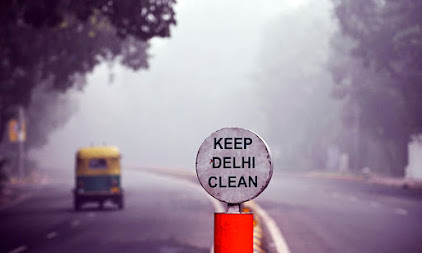New Delhi : The Indian capital chokes on smog while leaders go on playing their endless annual blame game.
India's air quality suffers from the country's appetite for fossil fuels, which has increased during two decades of rapid economic growth.
Last year, India was home to 15 of the 20 cities globally with the most hazardous air, and health experts have detailed how such conditions can lead to brain damage, respiratory problems and early death.
A thick blanket of noxious haze has settled over the Indian capital of New Delhi, burning eyes and lungs, forcing schools to close and prompting residents to call for action.
India's leaders have responded with what has become an annual tradition : pointing fingers.
The central government, run by Prime Minister Narandra Modi, has accused city officials of inaction, and vice versa. The country's Supreme Court has stepped in to shut down factories and order farmers to stop burning fields.
But the court's other efforts, which last year included ordering the installation of two air-scrubbing filter towers, have been derided as ineffectual.
The airborne murk and the towers are symbols of India's political dysfunction. The pollution has become an annual phenomenon, and the country's scientists can predict the worst days. But partisanship and official intransigence have hindered solutions.
New Delhi's residents don't agree who is at fault, but they agree that more must be done right away.
'' These last three weeks, I became a refugee. I was so sick I couldn't take it anymore,'' said Jai Dar Gupta, the owner of a business that sells air pollution mitigation tools, such as home air purifying machines and face masks.
Mr. Gupta, who divides his time between Delhi and Mussoorie, a city in the foothills of Himalayas that has better air, became an antipollution activist and entrepreneur in 2013, after developing asthma.
''It's really sad for a nation where every time there is a health emergency, the Supreme Court needs to intervene. That tells you everything about the apathy toward the health and life in our country,'' Mr. Gupta said. '' Nobody cares.''
The court acted last week in response to a petition filed by an 18-year-old activist after the city had endured pollution comparable to levels generated by major wildfires. The petition criticized officials for what it called their ''don't take any step'' position.
Last week, Delhi's emergency measures took effect. Construction activity, diesel generators and trucks were banned. Schools were closed and employers were asked to keep half their staff members at home. Six power plants outside New Delhi were shut.
Under pressure from the court, city officials also took steps that have inspired more jokes than optimism. They include anti-smog guns that create artificial mist, fire trucks to douse the douse streets with water and chemical dust suppressants.
''These are hardly measures,'' said Bahvreen Kandhari, a member of Warrior Moms, a group of mothers lobbying for cleaner air.
''These are reactions, knee-jerk reactions. Until you have the political intent, you know nothing is going to happen.''
The Publishing continues into the future. The World Students Society thanks authors Hari Kumar and Emily Schmall.

.png)


0 comments:
Post a Comment
Grace A Comment!